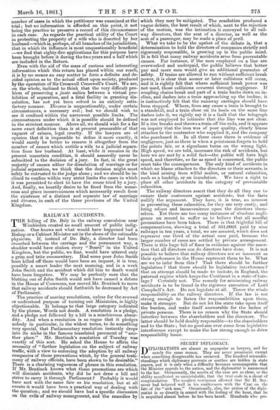RAILWAY ACCIDENTS.
The practice of moving resolutions, unless for the avowed or understood purpose of turning out -Ministries, is highly objectionable. It belongs to that large category indicated by the phrase, Words not deeds. A resolution is a pledge, and a pledge not followed by a bill is a mischievous absur- dity. And when a resolution is so vague that it pledges nobody in particular, in the widest terms, to do something very special, that Parliamentary resolution instantly drops into its niche in the famous tesselated pavement of "ano- ther place." Mr. Bentinck's resolution of Tuesday was exactly of this sort. He asked the House to affirm the necessity of "further legislation on the subject of railway traffic, with a view to enforcing the adoption by all railway companies of those precautions which, by the general testi- mony of railway officials, have been shown to be desirable." There is a charming vagueness of phrase in this resolution. If Mr. Bentinck knows what those precautions are which will diminish accidents, why did he not draw a bill and strive to carry it through Parliament ? Probably it would have met with the same fate as his resolution, but at all events it would have been a practical way of dealing with the question ; and we should have had a specific discussion on the evils of railway management, and the remedies by which they may be mitigated. The resolution produced a vague debate, the best result of which, next to the rejection of the motion, was the intimation it conveyed to all rail- way directors, that the seat of a director, as well as the seat of a passenger, may be made a place of peril. What we take to be the upshot of the debate is, that a determination to hold the directors of companies strictly and rigorously responsible, is growing up in the public mind. It is felt that many railway accidents arise from preventable causes. For instance, if the men employed on a line are overworked and underpaid, the public believes that better pay- and more men would give an additional guarantee of safety. If trains are allowed to run without sufficient break power, it is clear that sooner or later collisions will occur, and it is rightly felt that where sufficient break power was not used, those collisions occurred through negligence. If coupling chains break and part of a train backs down an in- cline, and dashes into a train approaching up the incline, it is instinctively felt that the runaway carriages should have been stopped. Where, from any cause a train is brought to a standstill, and a train close on its heels on the same line dashes into it, we rightly say it is a fault that the telegraph was not employed to intimate that the line was not clear. If a tire breaks and throws a train off the rails, and it appears on inquiry that the iron was of poor quality, clearly blame attaches to the contractor who supplied it, and the company who purchased it. In all these cases there is evidence of negligence, just as there is when a pointsman forgets to hold the points fair, or a signalman turns on the wrong light. High speed, we are told, increases the risk of accidents, -but here we are met by a solid fact—the public will have high speed, and therefore, so far as speed is concerned, the public must take the consequences. The only kind of accidents in which no blame attaches to the directors or their servants, is the kind arising from wilful malice, or natural calamities, such as a landslip, or an inundation. We have a right to place all other accidents in the category of preventable calamities.
The railway directors assert that they do all they can to ensure their customers against accidents, but the facts nullify the argument. They have, it is true, an interest in preventing these calamities, for they are very costly, and bring odium and inconvenience upon the directors them- selves. Yet there are too many instances of absolute negli- gence on record to suffer us to believe that all needful precautions have been taken. There is that frightful bill of compensations, showing a total of 331,0001. paid by nine railways in ten years, a total, we are assured, which does not represent one third of the actual sum paid, because the larger number of cases are settled by private arrangement. There is this huge bill of fines in evidence against the asser- tion that all directors can do directors have done. It is not possible to believe that railway directors are so innocent as their spokesmen in the House represent them to be. What are we to inter from this ? That there should be further legislation ? that there should be legislative interference ? that an attempt should be made to imitate, in England, the paternal regime which keeps the Continent in a state of tute- lage? Certainly not. The remedy for minimizing railway accidents is to be found in the rigorous execution of Lord Campbell's Act. Do not legislate at all. Throw the whole responsibility on the railway directors. If the law is not strong enough to fasten the responsibilities upon them, make it stronger. But do not let the state take upon itself the burden, and make itself answerable for the laches of private persons. There is no reason why the State should interfere between the shareholders and the directors. The latter should be held doubly responsible—to the shareholders and to the State ; but no good can ever come from legislative interference except to make the law strong enough to drive responsibility home.






























 Previous page
Previous page